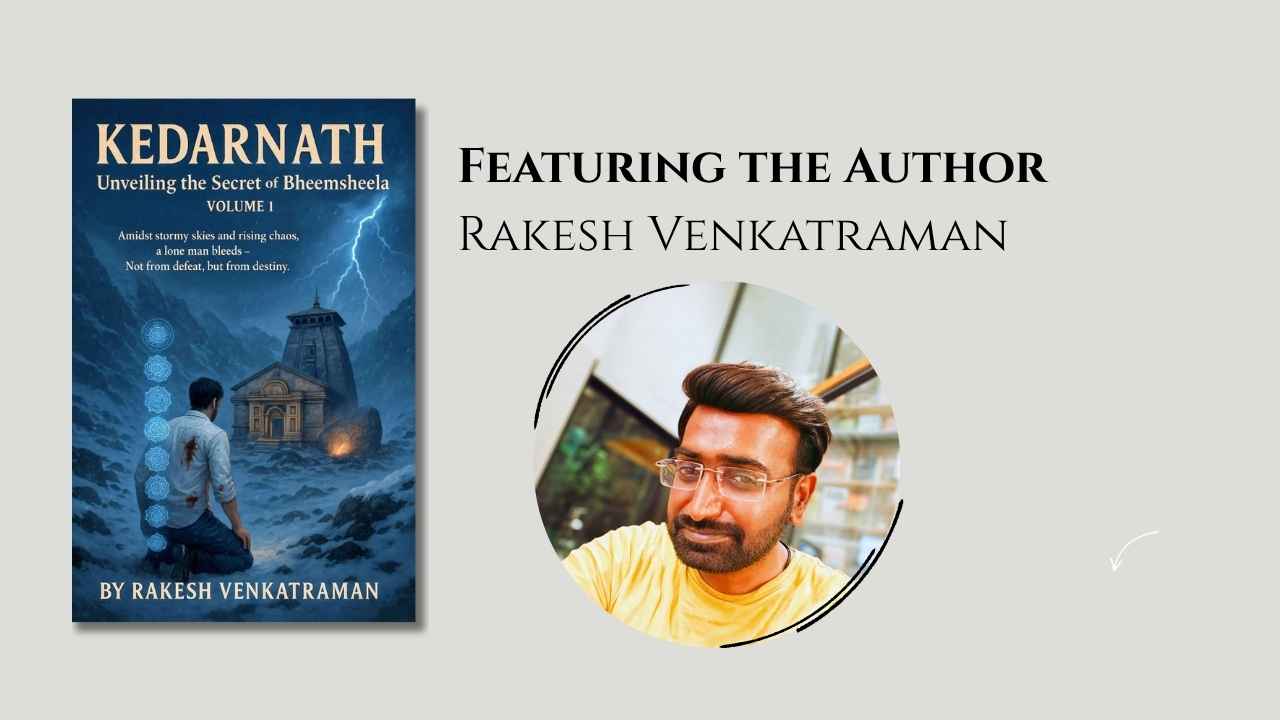Author Feature: Rakesh Venkatraman – Blending Myth, Philosophy, and Thrill into Living Stories
Rakesh Venkatraman is a storyteller who stands at the rare intersection of mythology, philosophy, and contemporary thrill. His book Kedarnath: Unveiling the Secret of Bheemsheela has already made waves as a spiritual thriller that brings alive the depth of India’s scriptures while holding readers spellbound with cinematic suspense. For Venkatraman, writing is not just a creative pursuit—it is a form of sadhana, a discipline of bringing timeless truths into modern narratives that resonate with today’s seekers.
The genesis of Kedarnath: Unveiling the Secret of Bheemsheela came from two deep currents in the author’s life: his fascination with Shiva and his unforgettable encounter with the devastating 2013 Kedarnath floods. The survival of the temple, shielded by the mysterious rock Bheemsheela, became for him not just a story of natural wonder but a metaphor for divine protection and inner resilience. He recognized in that moment a narrative waiting to be told—one that could connect mythology, personal struggle, and cosmic truth. For him, Bheemsheela is not just stone; it is symbol, shield, and reminder of the Shiva within.
Venkatraman’s inspiration is as personal as it is philosophical. His spiritual journey, coupled with questions about destiny, karma, and faith, drove him to explore the intersections of scripture and contemporary life. He immersed himself in the Vedas, Upanishads, Puranas, and the living traditions of India, visiting temples and sacred sites to ensure that his narrative carried authenticity. Yet he never wanted to simply retell mythology. His aim has been to reimagine it—to weave the wisdom of the ancients into a thriller that today’s readers could not just understand, but feel. In his own words, he sought to find that middle ground “where every listener feels both entertained and spiritually awakened.”
What sets Venkatraman apart is his ability to balance two seemingly opposite worlds: the profound depth of Vedantic and Puranic philosophy with the immediacy and pace of modern thrillers. Kedarnath is a story that takes the reader from Mumbai’s corporate chaos to the sacred ghats of Varanasi, into the heart of Kedarnath, Dwarka, and other Jyotirlingas. It is as much about the cosmic battle of light and darkness as it is about one man’s search for meaning, love, and surrender. The protagonist Rohan Desai is a mirror of many urban readers—trapped in routine and restlessness until destiny pulls him into a spiritual journey. His battles are not only against cults and forces of darkness, but against fear, doubt, and memory. Each chapter reflects the awakening of a chakra, and each trial becomes a mirror of inner growth.
Venkatraman acknowledges his literary lineage. He reveres Veda Vyasa for his ability to weave philosophy and human emotion into epic form, and Adi Shankaracharya for showing how philosophy can be lyrical, intimate, and universal. He also credits modern mythological fiction writers like Amish Tripathi for opening the path, though his own approach is deeply Vedantic, rooted in the textures of the Upanishads, Shiva Purana, and Bhagavad Gita. His storytelling draws from the eternal fire of these texts, but the narration carries the rhythm of today’s digital age, making it equally accessible to young readers exploring Audible or Storytel.
The writing journey, however, was not without challenges. Balancing authenticity with accessibility was his greatest test. As he admits, “It’s easy to either get lost in philosophy or go too commercial,” but through discipline, rewrites, and careful editing, he ensured that every scene served both the story and the spiritual message. Editing transformed his raw, emotional drafts into a narrative that feels alive and organic, guiding the listener as much as the protagonist.
For Venkatraman, the role of storytelling in the digital age goes beyond publication. He actively connects with his readers through social media, sharing reels, quotes, and behind-the-scenes glimpses of the book’s energy. His approach to promotion is rooted not in marketing but in building a bond. As he notes, real success comes when a reader feels inspired, healed, or curious after engaging with his content.
Kedarnath is only the beginning. Venkatraman envisions a long saga stretching across the sacred Jyotirlingas, each volume carrying not just action and adventure but deeper truths hidden within philosophy and psychology. While Volume 1.5 and Volume 2 are already in progress, he reveals that the journey will continue to blend mythology, philosophy, and raw human emotion until the entire cycle of Lingas is unveiled. Future books will even explore the psychological horror embedded in the Upanishads, a daring experiment to bring ancient wisdom into the landscape of modern genres.
Beyond the words, what Venkatraman most wants his readers to carry is a renewed understanding of spirituality. He believes it is not something separate from daily life, but hidden in struggles, emotions, and choices. Like Bheemsheela, which silently shielded the Kedarnath temple, every person has within them a hidden force of resilience and faith. He hopes his book not only entertains but also nudges readers to pause, reflect, and reconnect with the Shiva within.
For aspiring writers of the genre, his advice is clear: live what you write. “Don’t treat mythology or spirituality as just a trend,” he cautions. Instead, immerse in the scriptures, visit the temples, sit in silence, and let the energy settle into your being. Only then can the story stop being fiction and become something alive. Honesty, he believes, is more important than perfection. Drafts can be polished, but only sincerity can carry the soul of the story.
In Rakesh Venkatraman’s work, mythology is not a retelling, but a living pulse. Kedarnath: Unveiling the Secret of Bheemsheela proves that thrillers can be both fast-paced and deeply reflective, carrying the reader from the chaos of everyday life into the silence of the eternal. As his saga unfolds, one thing is certain—he is not merely writing books; he is building inner pilgrimages that invite every reader to walk alongside his characters, to confront their own shadows, and to discover their hidden strength.
Book review – Kedarnath: Unveiling the Secret of Bheemsheela




